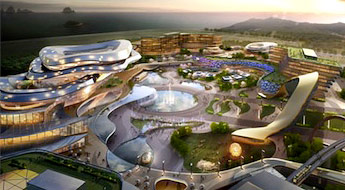South Korea could be next casino hotspot

South Korea looks like the consolation prize as Japan's USD 15 B casino dream fades, a setback for companies such as Las Vegas Sands that envisioned a new gaming hub rivaling Las Vegas in 2020. A bill that would have legalized casino gambling died when Japanese Prime Minister Shinzo Abe dissolved parliament on Friday to call a snap election.
That means lawmakers cannot pass regulatory legislation next year, making it highly unlikely any casinos will be ready in time to profit from tourists arriving for Japan's 2020 summer Olympics.
Sources involved in helping negotiate the bill's passage through parliament said it was unclear whether the legislation would even pass next year because the budget and defense are likely to dominate parliamentary debate. "It's challenging but not impossible," said pro-casino lobbyist Satoshi Okabe, head of ad agency Dentsu's integrated-resorts and tourismbusiness.
Others were less optimistic about a bill passing next year, saying it may not even make it to debate for a while
Developing new markets is important for casino companies as China's corruption crackdown and a slowing economy curb revenues in Macau, the world's biggest gaming hub. October revenues in Macau fell 23 percent, the largest monthly drop on record.
Japan is seen as the biggest unclaimed prize, a market that research firm Union Gaming estimated would generate US$ 15 billion in annual revenues, more than double what Las Vegas recorded last year.
South Korea, by contrast, generated US$ 2.4 billion in casino revenues last year, less than half of Vegas revenues and just 6 percent of Macau's take. That tally will grow as new casinos open. The main draw is Chinese tourism. Arrivals into South Korea from China rose about 53 percent last year, with some tourists signing on for triple packages that include cosmetic surgery, shopping and gambling. "South Korea already has got the gaming industry infrastructure," said Ben Lee, managing partner at IGamiX Management & Consulting, a Macau-based gaming consultancy. "At least they are familiar and don't have to go through the initial stages like Japan."
South Korea's first gaming-and-entertainment integrated resort, Paradise City, broke ground on Thursday and is expected to open in 2017. Joint venture partners Paradise Co and Sega Sammy Holdings plan to invest about US$ 1.17 billion.
Hong Kong-based Chow Tai Fook Enterprises, owned by Hong Kong tycoon Cheng Yu Tung, has signed a letter of intent to invest more than US$ 1 billion in a resort in Incheon where Paradise City and U.S.-based Caesars Entertainment Corp are building.
CEO Sheldon Adelson said last month he was visiting South Korea as part of an Asia trip with stops in Macau and Japan, and boasted of designing "the most iconic building in the world" in South Korea to house a casino and entertainment complex. He did not specify a location but Sands' head of global development, George Tanasijevich, was quoted by South Korea's Yonhap news agency as saying the firm was interested in Seoul.
Indeed, South Korea was mentioned 14 times during a Sands analyst call in October, according to a transcript from Thomson Reuters' StreetEvents. During the previous quarterly call in July, when Japan's gambling prospects looked more promising, Korea came up only twice.
Adelson sees one big obstacle: South Korea will allow only foreigners to gamble at large resorts. Locals are allowed to play in only one casino, which generates more revenue than the other 16 casinos combined. Adelson has been vocal about wanting to see that changed. "We are not interested in foreigners-only resorts," he said.